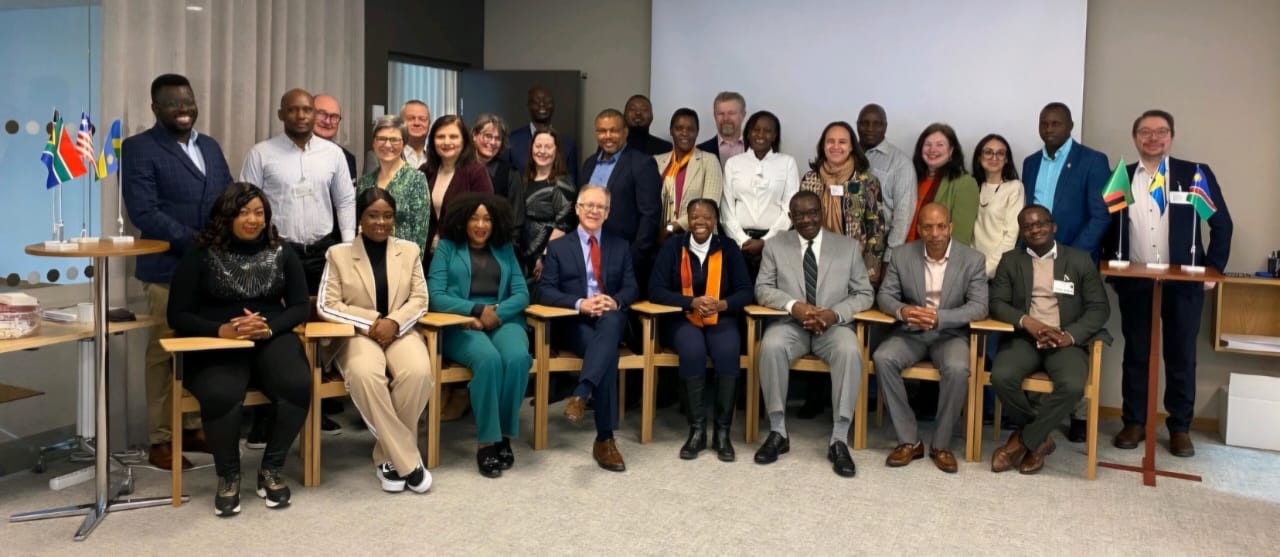Following a recent study visit to the Swedish Tax Agency, a high-power Liberian delegation- comprising the Minister of Justice-Cllr. N. Oswald Tweh, the Officer-In-Charge of the Financial Intelligence Agency of Liberia (FIA), Mohammed A. Nasser, and Cllr. Alexandra K. Zoe, Executive Chairperson of the Liberia Anti-Corruption Commission (LACC) participated in a 4-day Illicit Financial Flows (IFF) project gathering that sought to prevent and combat illicit financial flows and counter the financing of terrorism (AML/CFT).
The Swedish government’s contribution would be implemented in the form of an International Capacity Building Program (ICBP). This method supports sustainable change for participating countries by requiring their ownership and active participation to tackle illicit financial flows. The Swedish Tax Authority (STA) brings broad experience in addressing limitations in reform practices, and it is using the Problem-Driven Iterative Adaptation (PDIA) approach. Also, it focuses on finding local solutions for local problems regarding illicit financial flows (money moving illegally across borders). The STA has successfully applied this approach in partnership with collaborative Africa Budget Reform Initiative (CABRI) to work closely with African countries in demand-driven projects.
The 48 months (August 1, 2024- July 31, 2028) illicit financial flow project aligns with the African Union’s Agenda 2063 (Goal 20 on Financing Development) and the United Nations Sustainable Development Goals (Target 16.4 on reducing IFF).
In securing a robust AML/CFT framework against illicit financial flows in Sub-Saharan countries are expected to benefit from the project that aims at boosting domestic resource mobilization, fostering sustainable development, and promoting security across the African continent.
Speaking recently after the Liberian delegation return to Monrovia, FIA Officer-In-Charge, Mohammed A. Nasser, elaborated that African countries lose over 89 billion annually to illicit financial flows (IFFs), according to the most conservative estimates-an amount nearly equal to the combined annual inflows of official development assistance and foreign direct investment.
According to the FIA OIC, these flows drain resources vital for socio-economic progress, weakening state capacity and domestic resource mobilization, while stalling development in critical sectors such as healthcare, education, and infrastructure.
He mentioned that according to research conducted, unprosecuted criminal activities are some of the major factors that allow illicit financial flows to be continuously laundered into legitimate systems, fuelling corruption, organized crime, and terrorism.
Nasser said the IFF project looks at three (3) pillars, namely, country level support, regional cooperation opportunities and Civil Society Organizations’ engagements. These activities promote public awareness and support civil society’s role in promoting transparency and accountability through the provision of grants for CSOs, investigative journalism, whistle-blowers, and research labs focused on tackling illicit financial flows.
“Country level support aims at strengthening AML/CFT compliance and effectiveness by providing tailored-demand-driven technical assistance, and training, covering the entire process from detection, assessment, investigation, prosecution and asset recovery, through a multi agency approach, ensuring alignment with the Financial Action Task Force (FATF) standards.
Regional cooperation opportunities support the capacities of regional bodies and networks with an AML/CFT mandate. This mandate increases cooperation in financial investigations and improve information sharing on AML/CFT issues, the FIA’s boss Mohammed A. Nasser pointed out. He also disclosed that the 5-year Illicit Financial Flows (IFF) project will enable Liberia to get technical assistance in the following areas: revision of AML/CFT legislation, regulation, and institutional policy frameworks, legal and financial investigative capacity building, delivery of thematic online/onsite training, peer-to-peer exchanges, and mentorship assistance.
Additionally, national sectoral risk assessment and strategy development of tailored AML/CFT curriculum at a national level and the development of supervision regimes for Financial Institutions, Designated Non-Financial Business and Professions (DNFBPs), and Non-Profit Organizations, technical assistance and support Liberia is anticipated to receive.
Other technical assistance anticipated to be received by Liberia includes the following: Awareness-raising, promotion of interagency and public-private cooperation, facilitation of FATF Standards Training Course (STC), and joint Assessors’ Trainings, as well as Egmont membership.
Data exchange protocols, cross-border investigations, organization of regional conferences, workshops, networking events, digitalization expertise, development of statistical tools, procurement of AML/CFT related resources, and capacity building for CSOs on AML/CFT, anti-corruption, and whistleblower protection will also form part of the benefits Liberia stands to receive.

